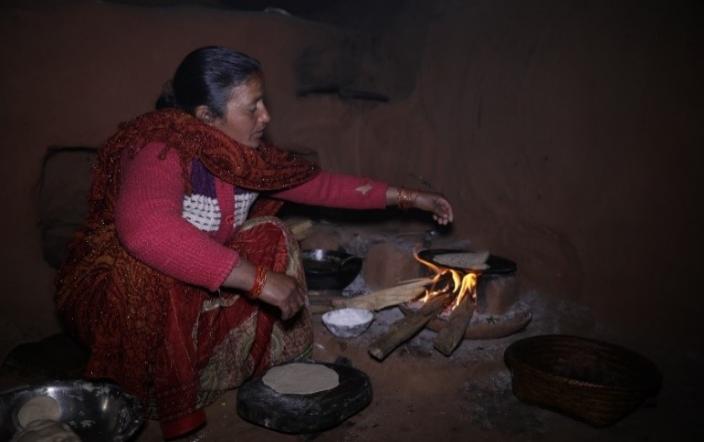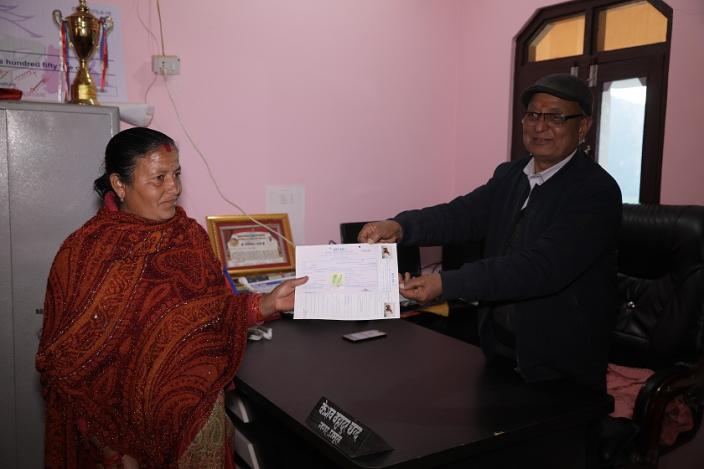Parbati, 40, lives alone in a two-story building in Patan Municipality of Baitadi district of Nepal. Her husband and son are away in India for work. Same is the situation in all ten households in her community. Mostly all male members are away for work, leaving female and young members of the family behind.
Due to lack of proper work and income generation opportunities, men are traveling to India in search of better work. Earlier, Parbati and her husband had quite a hard time meeting through the day. They had small land, but very low production. During dry season, they used to face shortage of food, because of which they had to take loans to manage their expenses. However, interest rates were high, piling more on their already existing financial burden.
Thinking about the hardships his family is facing, Parbati’s husband decided to go to India for work and better earning. While her husband is away, Parbati who is already struggling with daily necessities does substance farming in her small land to feed herself.

However, as she lives alone in absence of her husband and son, she was encouraged to join a nearby cooperative which is giving women like herself the platform to learn new things. Manager of the Udaydeb Mahila Saving and Credit cooperatives encouraged her to join the group, and now, Parbati is ever thankful towards her. With her engagement in the cooperative, she has also been part of technical trainings and financial literacy classes provided by cooperatives with support from Oxfam in Nepal’s Building Economic Resilience project in Baitadi district. The cooperative provides Remittance Service, Saving, Credit and other capacity building trainings in coordination with Oxfam in Nepal’s local partner Rural Development and Environment Management Society (RUDES) to the families of migrant workers of Patan Bazaar.
Remittance service is one of the key business component of the cooperatives through which male members working away from home, sends money back to their homes with help from this service. And, same has been very fruitful to Parbati’s life too. Her husband now sends back money through this service, which was not feasible earlier. Due to lack of remittance service in her village, her husband has been robbed many times on his way back home, leaving every earning in vain. Many cases of robbing have been heard and similar situation was faced by other male members of the community as well. However, the remittance service has highly reduced the risk of threat to life and money.
Adding more to the benefits received from the cooperative, Parbati and other women from the community can pay their electricity bill, mobile recharge, TV service through the cooperative itself. Moreover, she has been able to cover the insurance of her husband and son. The Accidental Insurance program is launched by Patan municipality, and currently, municipality in collaboration with Oxfam has been paying the insurance coverage of 255 migrant workers. Premium varies as per the age ranging from 750 to 1200 Nepali rupees.Apparently, this is the first time in Nepal where migrant workers working in India are insured. “I am very happy to receive insurance paper of my son and husband. This step is a sign of relief for all wives and mothers of migrant workers,“ said Parbati, happily. The insurance also serves the purpose of data keeping which is very useful, as till date no such data was recorded. The mayor of Patan municipality committed to sustainability of the insurance program. “It is not good for workers living in India for years and to remain out of security system. They are our people and we have a responsibility to ensure their well-being. We have started insurance scheme with support from Oxfam in Nepal and RUDES. “said Mayor Keshab Bahadur Chand. The municipality plans to continue the program with support from local community.

Local and provincial government has been sensitized on the issues faced by migrant workers to India and their families through the project activities. The project is running in three districts of Nepal; Baitadi, Darchula and Argakhanchi and has benefitted 3,614 households. 620 migrant workers have been insured for one year with support from Municipality and Oxfam. However, municipality has committed to continue the program with support from community. 42 cooperative facilitators have been created who has conducted 214 financial literacy classes for women. Furthermore, the project has increased the confidence of women in enterprise sector. Around 600 women has already made their business plans, out of which 70% has started their businesses such as poultry farming, vegetable farming, rice farming, goat farming, etc., which has supported women to uplift their livelihood. All the key stakeholders, such as local government, private sector (Bank) and communities are fully involved in to address the challenges faced by the communities.
Women like Parbati is now self-assured about themselves and their families whose members are working away from home. Linkage with cooperative have opened many doors of opportunities to sustain life in a productive manner. Parbati feels happy for herself and for all the women in her community whose family members are now secured.
By Sofila Vaidya and Shreedhari Pandey
